Physical Address
304 North Cardinal St.
Dorchester Center, MA 02124
Physical Address
304 North Cardinal St.
Dorchester Center, MA 02124
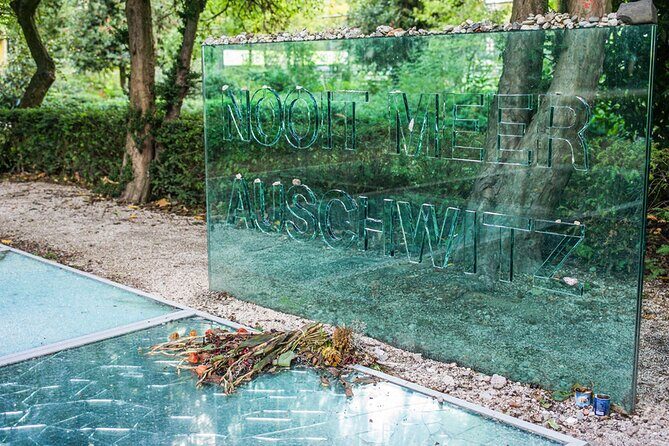
Discover Amsterdam’s Jewish Quarter and WWII history on a 2-hour guided walking tour, with passionate guides, meaningful sights, and authentic insights.
A thoughtful look into Amsterdam’s Jewish history and Anne Frank’s story, this walking tour combines history, emotion, and local insights.
It covers key sites in the Jewish Quarter, accompanied by passages from Anne Frank’s diary, providing a personal touch to the somber themes. One of the things we love about this experience is its small-group setup, which allows for more engaging storytelling and questions. The tour is also priced affordably at around $32.50, making it accessible for many travelers seeking meaningful culture and history.
However, a possible drawback is that you won’t visit the inside of the Anne Frank House—this is just a walking tour of the surrounding Jewish Quarter, which might disappointment some expecting to see the famous museum. But for those interested in exploring the area’s history, understanding the local Jewish community, and hearing personal stories, this tour hits the right notes.
This experience is best suited for history buffs, those interested in WWII and Holocaust remembrance, and travelers who appreciate meaningful, guided walking experiences. If you’re short on time but eager to learn about Amsterdam’s Jewish heritage and Anne Frank’s story through detailed storytelling and authentic sites, this is a solid choice.
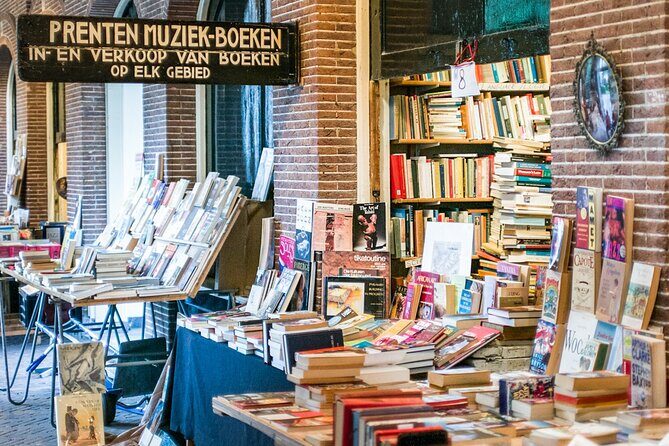
Amsterdam’s Jewish Quarter is a neighborhood layered with tales of resilience, community, and tragedy. This tour does a commendable job of weaving together physical sites with the historical and emotional narratives that make this area so compelling.
The tour begins at the Waag, a historic building that marks the start of your journey. From there, you’ll head to Nieuwmarkt, a lively square where the Jewish community first settled, partly due to its strategic location. As you stroll, your guide will explain why this part of Amsterdam became a hub for Jewish residents.
One of the highlights is the visit to Museum Het Rembrandthuis, not just for its art history but for the fact that Rembrandt’s home was situated right in the heart of the Jewish Quarter. This added layer of context helps you understand how the area’s cultural fabric thrived before WWII. Reviewers note that guides like Kaya or Jesse are excellent at linking the art and history, making these stops more meaningful.
The Auschwitz Monument is an emotional stop that prompts reflection on the Holocaust’s victims. Here, you’ll be invited to pause and consider the scale of loss, with the guide providing insights that deepen the understanding of this tragedy.
Other notable landmarks include the South Church, built over the site of the Black Death cemetery, and the Jewish Museum (although inside visits aren’t included). The guide explains how the Nazi deportation system was implemented locally, offering a sobering look at how the war affected the community.
The Portuguese Synagogue reveals the resilience of Amsterdam’s oldest Jewish congregation, especially during WWII when it played a significant role in the community’s survival. Tour reviews praise guides like Linn for their ability to bring history to life, often reading passages from Anne Frank’s diary to add a personal dimension.
The Holocaust Names Monument is a powerful conclusion—featuring over 102,000 bricks with names of victims, including Anne Frank’s. Reviewers commonly mention feeling a profound emotional impact here, especially when guides point out Anne’s name and share stories that bring history home.
If you enjoy exploring Amsterdam on foot, these walking tours might also suit your style
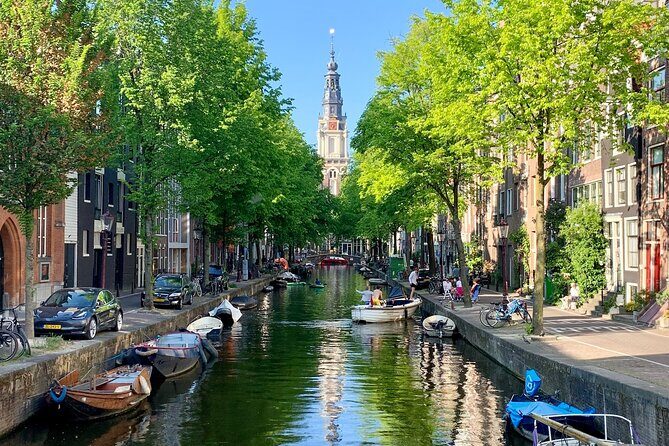
The tour is led by licensed guides who speak both English and German fluently, adding flexibility for international visitors. Many reviews praise guides such as Valentina, Kaya, Linn, and Jesse for their passion, detailed knowledge, and storytelling abilities. From personal anecdotes to reading passages from Anne Frank’s diary, their stories add depth and authenticity.
Group sizes are small, typically allowing for more interaction and questions. This intimacy often enhances the experience, making it less like a scripted walk and more like a conversation with a knowledgeable friend.
Reviewers frequently mention how guides like Valentina or Kaya went beyond just pointing out sites—they shared personal insights, historical context, and even answered questions about the area’s current state. One reviewer noted that their guide, Jesse, “referred to verses in Anne Frank’s diary which brought the tour to life,” highlighting how these personal touches make a difference.

Your journey kicks off at this historic guildhall, a building that has seen centuries of Amsterdam’s evolution. It’s a symbolic start, connecting the past with the present. You might not spend long here, but it sets the tone for the exploration ahead.
A lively square with history rooted in strategic Jewish settlement, this stop offers context about the community’s roots. Expect a brief but insightful explanation of why this area was chosen by Jewish families.
While you don’t enter the museum, the guide explains how Rembrandt’s residence was in the Jewish Quarter, tying art history to the neighborhood’s cultural importance before WWII. Reviewers note that guides like Kaya excel at making these connections meaningful.
A poignant reminder of the Holocaust, this site prompts reflection. The guide’s narratives help you grasp the scale of loss and the importance of remembrance.
These sites add layers of understanding. The South Church is built over an old Black Death cemetery, while the Jewish Museum explains Nazi deportation methods (without inside visits), and the Portuguese Synagogue demonstrates the community’s resilience.
With over 102,000 names, this monument is emotionally intense. Guides help you locate Anne Frank’s name and contextualize her story among the countless others lost.
At around $32.50 for a 2-hour experience, this tour offers impressive value, especially given the passionate guides and the depth of stories shared. The small-group format encourages questions and personalized storytelling, which many reviews highlight as a key strength.
It’s important to note that the tour doesn’t include entry into the Anne Frank House, so if you want to visit that museum, you need to book separately. Nevertheless, this walking tour provides a rundown of the Jewish Quarter’s history, making it ideal for those short on time or preferring an outdoor exploration with meaningful commentary.
Since it runs rain or shine, be sure to dress appropriately—an umbrella can make all the difference on a rainy day. The meeting point is conveniently located at the Waag, with easy access to public transportation, making it easy to incorporate into your Amsterdam itinerary.
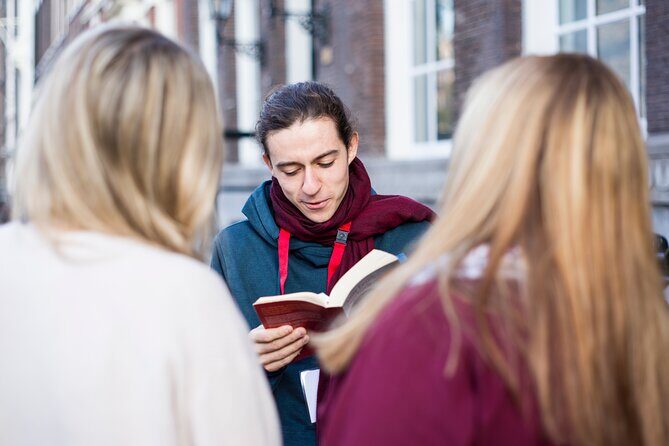
This experience is perfect for history enthusiasts, students of WWII, and anyone interested in Jewish culture in Amsterdam. The storytelling style and emotional sites make it especially suitable for those who want more than just a superficial overview.
If you’re traveling with others who appreciate authentic, insightful, and emotionally resonant tours, you’ll likely find this walk rewarding. It also appeals to those who want to understand the local impact of WWII, beyond just the well-known museum.
However, if your primary goal is to visit the interior of the Anne Frank House, this tour isn’t the right fit—separate tickets are needed for that.
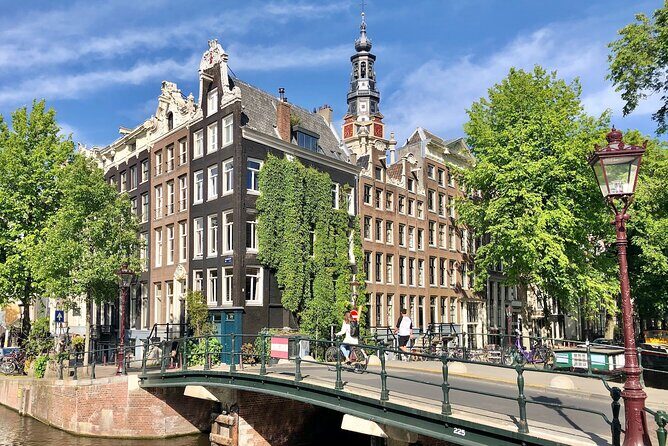
This Anne Frank Walking Tour and Jewish Quarter experience offers a respectful, engaging, and educational exploration of one of Amsterdam’s most historically significant neighborhoods. The guides’ passion and depth of knowledge turn a simple walk into a meaningful journey through time.
While it might not satisfy those eager for inside museum visits, the combination of authentic sites, evocative stories, and emotional monuments makes this a powerful addition to any Amsterdam visit. It’s especially suited for travelers who value storytelling, historical context, and a personal connection to the past.
If you’re looking to understand the Jewish community’s resilience and face the darker chapters of history with compassion and insight, this tour is well worth considering.
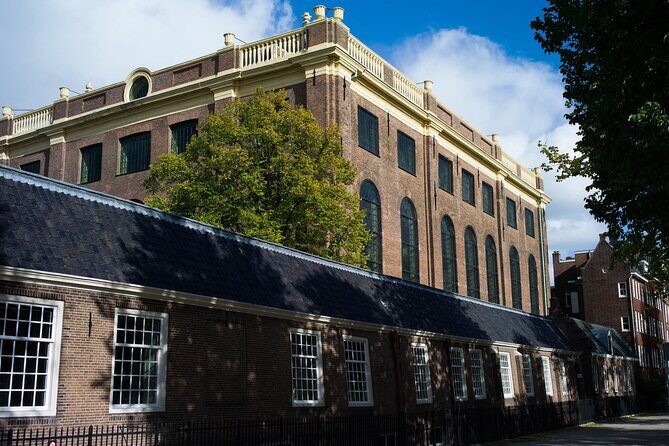
Is this tour suitable for children or teenagers?
Yes, it is generally suitable, especially for those interested in history. Guides may read passages from Anne Frank’s diary, which can be very engaging for younger audiences.
Does this tour include entrance to the Anne Frank House?
No, it doesn’t. If you want to go inside the Anne Frank House, you will need to book a separate ticket.
How long does the tour last?
The tour lasts approximately 2 hours, making it a manageable visit that fits well into a day’s sightseeing.
Can I book this tour in German and English?
Yes, the tour is offered in both German and English, providing flexibility for international travelers.
What is the meeting point?
The tour starts at the Waag, located at Nieuwmarkt 4, in central Amsterdam—an easily accessible location.
Are tips included?
No, tips are not included in the tour price but are appreciated if you feel the guide did a good job.
What should I bring?
Dress for the weather—bringing an umbrella is advisable. Comfortable shoes are recommended for walking around the neighborhood.
This tour stands out for its authentic storytelling, passionate guides, and respectful approach to Amsterdam’s Jewish history, making it an experience that’s both educational and emotionally impactful.